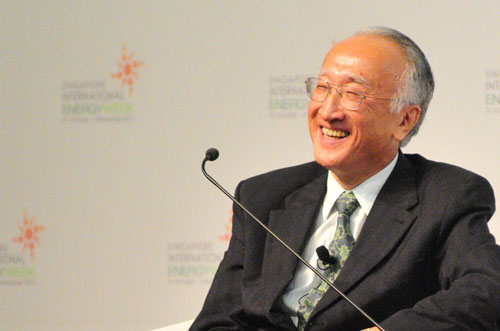
(Photo credit: EMA)
Mr Nobuo Tanaka, in his presentation at this year's Singapore Energy Lecture (SEL), noted that Singapore is an important platform for facilitating and driving enhanced dialogue within the region towards our collective energy future. He recalled the Singapore Prime Minister's address in last year's SIEW on the revived interest in nuclear power.
Economic growth and uncertainty
High oil prices will derail economic growth. "If US$100 oil continues, it will be as bad as 2008," said Mr Tanaka who had just stepped down in September as Executive Director of the International Energy Agency (IEA). Emphasising the relationship between economic downturns and high oil prices, he suggested that sustained current prices could cause the oil burden to reach 5 percent levels over the year. This would threaten economic recovery.
He briefly mentioned the impacts of the ongoing Arab Spring on oil prices. Underscoring its significance was the IEA's unprecedented "preemptive attack" earlier this year in its decision to release its member state's strategic oil stockpiles to soften the global economic impact of higher oil prices.
Mr Tanaka also highlighted the growing importance of Asia as the emerging center for the global economy. The momentum of this growth will place commensurate pressures on supply of energy. The current volatility in both the economic and energy markets thus confers increased risks to Asia's emerging economies. The interactions of these uncertainties will make it challenging for policymakers to construct energy policy.
Changing role of nuclear power and gas on climate change
Not surprisingly, Fukushima was a talking point, with Mr Tanaka acknowledging the impact of Japan's recent nuclear crisis on energy security, the global energy fuel mix and climate change.
With the current backlash against nuclear energy, the viability of nuclear power has decreased. In this unfavourable "Lower-Nuclear Case", nuclear power will fall to 10 percent of global generation by 2035, from today's 14 percent, he believes. This will increase the need for compensating fuels. As an example, the Global Associate for Energy Security and Sustainability at the Institute of Energy Economics, Japan (IEEJ).
As an equivalent, the spritely Japanese said this would require an additional Australia's worth of production for steam coal, another Qatar for liquid natural gas (LNG), and five more Germanys for renewables. As a caveat, he noted that this will be costly and detrimental to energy security because energy import dependency will increase.
Going Low Nuclear will also pose serious issues for sustainability. Understandably, replacing nuclear power with these fuels will cause CO2 emissions to increase significantly, especially since carbon capture and storage technologies are not yet economically viable. Mr Tanaka said this would mean that climate change abatement by technology will be "almost impossible". He suggested that negotiators in Durban should talk more seriously about adaptation than mitigation.
Gas will become the bridging energy source for economies moving away from nuclear power. Current trends show that gas already plays a paramount role in Asia, with a growing part in China, India and Southeast Asia's energy mix. The significance of shale gas investment and infrastructure was also highlighted.
The growing importance of natural gas has been analysed by the IEA in the "Golden Age of Gas" scenario. Asia's emerging economies will use more gas because of its lower carbon intensity relative to other fossil fuels. In this scenario, coal consumption will decline.
Coal, said Mr Tanaka, remains important for emerging economies. But its pollutive nature means investments in carbon capture and storage are paramount for sustainability as conventional technologies will lock in future carbon emissions. He observed that this scenario may see different geopolitics of gas that will be good for energy security. However, carbon emissions will be roughly similar to current levels.
The gas scenario, said Mr Tanaka, is therefore "good for producers, but not for sustainability".
Role of Asia and need for collective action
Takeaways post-Fukushima included the need for multilateral cooperation for the future of electricity. Speaking on the need for "comprehensive energy security," he made the call for collective action from both the IEA member countries and Asia's emerging economies to create a strategic oil stockpile to buffer the impacts of oil supply shortages. "The important question for Asia is whether it should join the IEA as full members or whether a new organisation should be built for Asia," said Mr Tanaka. The broader point, as he pointed out to a 900-plus audience, is that Asia needs to be serious about oil security for the future.
The end game to confront the energy security challenges of the 21st century will center on stabilising electricity supplies through using different sources and designing markets in accordance with new smart grid technologies. Highlighting Japan's electricity grid ,woes painfully exposed after 11 March, he noted that careful design of the electricity market is essential not just to ensure stable electricity supplies, but also to effectively utilise variable renewables.
Asia's emerging economies will require more collaborative collective action for the future. He noted that one country cannot enhance energy security by risking others.
No holds barred
As CNBC anchor and SEL moderator Geoff Cutmore put it succinctly, there's no better time than this year's Lecture to grill keynote speaker Tanaka on cutting issues of energy, having stepped down fresh from a leadership position at the International Energy Agency (IEA).
In response to questions on Japan's nuclear plans, Mr Tanaka highlighted that the country would end up spending ¥3 trillion in annual fuel costs for power generation, to make up for lost capacity at idle nuclear power plants.
On that note, Mr Tanaka called for Asia to decide on a suitable producer-consumer framework for enhanced dialogue in working towards securing our collective energy future.
Watch Tanaka on video as he talks about
what Asia needs for energy coordination.
Download his presentation slides here.
BY : Augustin Boey, Melissa Low and Catrina Yeo, Energy Analysts, Energy Studies Institute